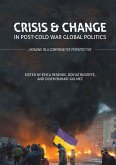"As we settle into a new century of global conflict, the contours of the one just ended are snapping into focus. This volume casts fresh light on one of that century's most humanist observers: Isaiah Berlin. Through historical and philosophical exploration, the three authors here ask us to consider Berlin and his legacy anew, asking what he meant in his time, and what he might mean for us." -James Chappel, Duke University
"A very stimulating volumethat places Berlin's thought in the post-war context without reducing it to a mere expression of its time. The essays help us to see that it was as much Berlin's "untidy" exploration of political psychology as his principles that expressed the liberalism he cherished." -Mark Lilla, Columbia University
This book offers a critical re-examination of Berlin's Cold War liberalism, at a time when many observers worry about the emergence of new global, partly ideologically driven conflicts.
Jan-Werner Müller is a professor of politics at Princeton University.
Dieser Download kann aus rechtlichen Gründen nur mit Rechnungsadresse in A, B, BG, CY, CZ, D, DK, EW, E, FIN, F, GR, HR, H, IRL, I, LT, L, LR, M, NL, PL, P, R, S, SLO, SK ausgeliefert werden.









